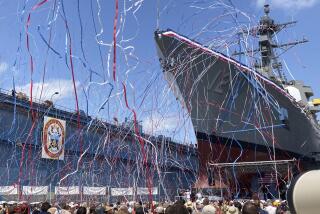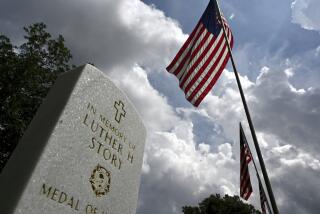Reginald Myers, 85; Won Medal of Honor in the Korean War
- Share via
Reginald Myers, a Marine Corps colonel who received the Medal of Honor in the Korean War for leading his vastly outnumbered force in an assault on a key position during the Battle of the Chosin Reservoir, has died. He was 85.
Myers died Oct. 23 at a hospice in West Palm Beach, Fla., of the effects of a stroke.
Before Myers set foot in Korea, he was a veteran of some of the fiercest fighting in the Pacific during World War II. As a young Marine officer who rose rapidly through the ranks from second lieutenant to major, he fought at Guadalcanal, the Solomon Islands, the Marshall Islands and Okinawa.
He went to Korea in July 1950 as a battalion executive officer in the 1st Marine Division. He received two Bronze Stars four days apart in September, first as part of the U.S. invasion at Inchon and later for rescuing two wounded Marines.
In late November 1950, Myers’ assignment was to recapture a high point of land near the Chosin Reservoir called East Hill. An Army unit trying to defend the hill had been driven from its position by Communist Chinese troops. Ordered to retake the hill to secure a safe evacuation for the outmanned United Nations forces, Myers, then a major, did not have a standard fighting force to command.
“I had no Marine rifle company or unit of any type in my area,” he told the Idaho Military Historical Society in a 2001 interview. “So, as I walked toward East Hill, I formed my own combat element from support Marines, such as cooks, truck drivers, maintenance personnel and administrative personnel.... I ended up with about 50 hard-charging Marines that were raring ... to get into the fight, and the 200 soldiers at the bottom of East Hill -- 250 overall.”
With that improvised unit, Myers led an attack against an entrenched force of 4,000 Chinese troops Nov. 29, 1950. The conditions could not have been more forbidding: He launched his charge at night, up a steep, snow-covered hill in biting wind and a temperature of 23 below zero.
Only 80 of Myers’ 250 troops reached the summit with him, but they were able to hold the hill in spite of steady machine-gun fire and repeated Chinese assaults. According to his Medal of Honor citation, Myers “persisted in constantly exposing himself to intense, accurate and sustained hostile fire in order to direct and supervise the employment of his men and to encourage and spur them on in pressing the attack.”
He directed artillery and mortar fire and set up emplacements to defend the hill from Chinese efforts to recapture it.
The intense fighting lasted 14 hours before reinforcements arrived. In that time, Myers’ force killed more than 600 Chinese soldiers and wounded 500.
“I was proud of my Marines,” he said four years ago. “They proved that a Marine, whether a truck driver, a cook, a clerk or whatever, was foremost a fighting combat rifleman.”
Reginald Rodney Myers was born Nov. 26, 1919, in Boise, Idaho. He grew up in Boise and Salt Lake City and graduated in 1941 from the University of Idaho. He was in the Army Reserve before becoming a Marine officer in September 1941.
After serving in the Pacific in World War II, he took part in the occupation of northern China and was later stationed at Marine bases across the United States.
After his heroic deeds at East Hill, Myers remained in Korea until he was wounded in action in April 1951. In a White House ceremony six months later, he received the Medal of Honor from President Harry S. Truman.
The commander of the unit that relieved Myers’ at East Hill, Marine Capt. Carl Sitter, was also awarded a Medal of Honor the same day, an indication of the intensity of the fighting.
Myers served at Quantico Marine Base from 1953 to 1958, when he became assistant naval attache to the U.S. Embassy in London. In 1961, he was named to the Strategic Plans Division of the Chief of Naval Operations at the Pentagon, and he later served at Marine Corps headquarters.
He received a master’s degree in business administration from George Washington University in 1965 and retired from the Marines in 1967.
In addition to the Medal of Honor and two Bronze Stars, his military decorations included the Legion of Merit and Purple Heart.
Survivors include his wife of 62 years, Margaret Myers; two children; five grandchildren; and a great-granddaughter.


